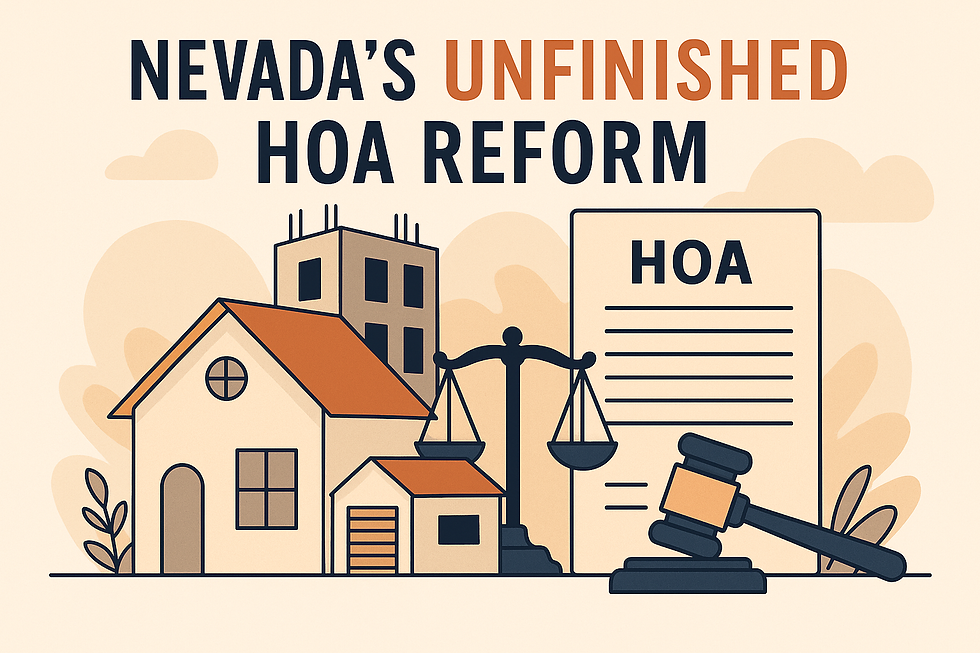
Are Nevada Judges the Best Money Can Provide?
- Mike Kosor
- Sep 29, 2025
- 5 min read
The title of this post borrows from a quip often attributed to Mark Twain, who spent time in Nevada as a young reporter: “We have the best legislature money can buy.” The echo is intentional. It is meant to be challenging — not acquiescent — because the same hard questions Twain’s line raised about lawmakers now need to be asked of Nevada’s courts.
The Nevada Supreme Court is one of the most powerful institutions in the state — yet today, it is an institution without a real check from voters. This post spotlights why this should concern every Nevadan, particularly those who owns a home in an HOA. A productive conversation is needed.

Nevada Supreme Court bench uncontested
In 2022, both justices up for election ran unopposed. In 2024, three more did the same. That means five of the seven current justices were seated without voters ever being given a real choice. Over the last decade, the pattern has been nearly unbroken: uncontested incumbency.
In a state with more than 8,000 licensed attorneys, not one has stepped forward to challenge a sitting justice? Why?
The compensation is modest by attorney standards, yes, but not trivial. They line up eagerly when an interim vacancy opens. Yet come elections, the field goes silent. Just coincidence? Doing so creates professional risk? Maybe unwanted challenge to the insider network? Whatever- the chilling is unmistakable, and the public is left without a choice.
This vacuum demands scrutiny. What we are asking, at least on its face, is simple: a neutral, public review of Nevada’s judicial election dynamics — by lawmakers, by the Secretary of State, and by the press. Before prescribing what will surely be a controversial cure, we first need an honest diagnosis.
Why Judicial Reform Belongs in the HOA Conversation
Some may ask why NVHOAReform — a project focused on HOA transparency, homeowner protections, and legislative oversight — is turning its attention to the courts. The answer is simple: every reform we fight for ultimately depends on how the judiciary interprets and enforces it.
Just as the U.S. Supreme Court decides cases that have important and wide-ranging public policy implications, so too do the state supreme courts, deciding cases arising from state laws. Given the vital role that state courts play in democracy, the process by which judges are selected is extremely important.
The American Law Institute (ALI) — a prestigious organization of judges, law professors, and lawyers — has cautioned in its Restatement (Third) of Property: Servitudes that common-interest communities must be viewed with “special judicial scrutiny” because of their unique potential to burden individual rights. Nevada courts — and lawmakers simply watching — appear to have dismissively ignored that warning.
We have urged lawmakers to close loopholes in NRS 116 and complete its work it started more than two decades ago — finish building a fair, balanced framework for common-interest communities. We, along with the press, have called for the Real Estate Division to be raised out from under the control of the industry it is supposed to regulate, to end its secrecy, and to be responsive to owners. We call on the CIC Commission to act, not just rubber-stamp.
And we applaud that the CIC Task Force may finally do the work lawmakers assigned it years ago, presuming the governor’s push for accountability is more than pandering.

Nevada’s courts — with the support of the Nevada Supreme Court — treat “HOA stuff” as beneath them and the results are predictable: mandatory ADR gets quietly narrowed, statutory text is brushed aside, amendments stand without a single owner vote, and chilling fee awards for deep-pocketed boards and their lawyers sail through with barely a glance. Never mind that what is at stake are people’s homes and property rights — the courts wave it off as if it were no more than a dispute over barking dogs or paint colors.
Courts cannot elevate their own impatience or preferences over what the Legislature enacted; their role is to enforce the laws our elected representatives actually passed. The condescension ensures that even the strongest reforms are hollowed out once they reach the courtroom.
As long as the civil courts remain the only avenue for resolving disputes between homeowners and their associations — a problem at the very top of our reform priorities — the judiciary will continue to hold extraordinary influence over the balance of power in Nevada’s communities. That role makes it all the more concerning when appellate courts appear dismissive of “HOA stuff” and are too willing to move beyond adjudication into reshaping the laws our elected representatives have enacted.
Accountability, or the Lack of It

“What is it that makes us trust our judges? Their independence in office and manner of appointment.” John Marshall, fourth Chief Justice of the U.S. Supreme Court
Judges who face no challengers, year after year, are not being tested for independence — they are being preserved in amber.
Accountability is NVHOAReform’s central demand — and, at least on its face, the governor’s theme. Yet at the judicial level, accountability remains elusive.
Judging is supposed to be a meritocracy. But how can Nevadans judge merit when choice never makes it to the ballot? Court decisions are buried in dense case law, elections go uncontested, and the average voter has no way to measure performance.
The Stakes for Homeowners
For Nevada homeowners, this is not abstract theory. The impact is real: when courts' response is not careful scrutiny but financial punishment. Fee awards are routinely granted absent any real examination of the merits — large enough to silence ordinary citizens from ever questioning their rights again. This isn’t accountability. It’s a warning: challenge the system, and you risk financial ruin.
Recent judiciary’s rulings have decided whether:
Owner protections can be “waived” away.
Amendments to HOA constitutions absent owner vote — that should be void — allowed.
Egregious level fee awards permitted and imposed simply for seeking answers, and
The blind application of court “rules” designed for general civil disputes — never meant for entities like HOAs — can permanently cut off claims, extinguishing rights the Legislature never intended to remove — raising real due process concerns.
If the Legislature does not compel judicial restraint or provide voters the ability, then accountability ends at the courthouse door. That leaves homeowners with one final safeguard: a safeguard that feels all too shaky — their collective voice and their vote.
A Call for Vigilance

This is not simply about HOAs. It is about the rule of law in Nevada. When courts treat homeowners’ rights as beneath their notice, and when judicial elections offer voters no meaningful choice, accountability collapses.
For homeowners, the takeaway is clear: accountability cannot be optional. If the courts cannot provide it, then homeowners must insist on it — not just in their communities, but in the institutions that govern us all.
This is not a new conversation. As far back as 2019, the the press has run op-eds advocating for merit selection of judges, tracing prior reform attempts and chronicling how those efforts have repeatedly been rejected or shelved. Read one here noting proposals in 2019, earlier efforts in 1972, 1988, 1995, 2010, 2015 — and talk about how reform has repeatedly stalled.
It cannot be continually set aside. It must be resurrected now, not deferred to 2026 when another cycle of uncontested incumbency will already be decided.
This post is only the start of that vigilance. In the months ahead, NVHOAReform will return to these themes — judicial elections, statutory interpretation, and accountability — to keep homeowners focused on what is at stake.




Comments